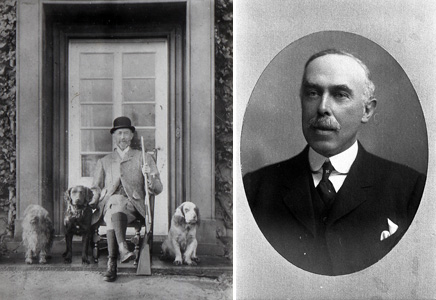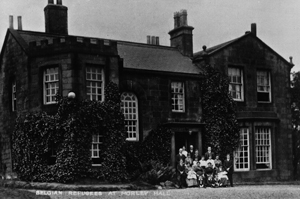The Belgian Refugees in Morley
Topics
The Refugee Crisis
Housing the Refugees
The Arrival of the Refugees
Settling in Morley
Later Years
The Refugee Crisis
The Great War started, formally, when Germany invaded Belgium. The British Government was surprised and deeply upset by this action which went against a previous treaty and also posed a direct threat to the country.
The invasion was swift and brutal to the extent that many Belgians fled their homes and became refugees. It has been estimated that 250,000 of them came to Britain and the Government had the problem of housing them.
Housing the Refugees
The Local Government Board asked authorities all over the country to help out and Morley received such a request in October 1914. The Mayor made a public appeal but then received a direct offer from Mr R. Borrough Hopkins, the town’s first Town Clerk, who offered to house a number of them in Morley Hall.

In 1914, Hopkins had control of Morley Hall but it was empty. It had belonged to his friend, Oliver Scatcherd, the last of the Morley Scatcherds. When Scatcherd and his wife died, they left their home to Hopkins who was a qualified solicitor with much experience in property transactions. It is, therefore, surprising that the house was empty.
He was prepared to allow its use for one year free of charge and the Council said it would modify it to house around 35 refugees and pay its upkeep for one year. It was before the days of the Welfare State and they would be expected to find jobs.
By 1916, the hall was empty once more as families had relocated to other parts of the town or country. Later, Borrough Hopkins sold the house to Charles Scarth, the textile magnate. Scarth, in turn, donated it to the Borough of Morley for it to be used as a Maternity Hospital. This will be considered elsewhere.
Arrival of the Refugees
Although two local families had already given help to refugees, events moved quickly after this civic agreement. After one unfortunate misunderstanding with the London authorities, the first group of Belgians arrived and were given a fine welcome by the Mayor and a large crowd. Part of the Morley Observer’s lengthy report is shown below.

21 Belgian Refugees arrive in Morley
They were in three groups with two single people:
Mme Victoria Maes and her seven children from Berchem, a suburb of Antwerp;
The Vekerman family and their niece Clothilde Van Poeck who were also from Berchem;
Others who also came from the Antwerp area were:
Mme Van de Weyer and her four children.
Martin Valkenberg, a dock worker and Aubertine Lenaert
Settling in Morley

This photograph/postcard, made by S. Barnes, the local photographer and newsagent, is likely to be that of these first refugees, a mix of young and old including a family group.
None could speak English but, for the most part they settled into their new home quickly.
Victoria Maes and her family had a delightful re-union when her husband, Jacques Antoine, a diamond cutter, came to Morley in March 1915. The Morley Observer tells of his perilous journey from Belgium to France. He said his intention was to join the armed forces.
On 20-May-1916, Joseph, the eldest son in the Maes family, married Clothilde Van Poeck at St Francis Church, Morley’s only Catholic church. By that time, both were employed in the area and living in Morley and Churwell respectively. We have no other knowledge of their later life.

Some of the refugees had worked in the country previously. Nestor Robiette had married a Welsh woman in the late 1890s while working in the tin-plating industry in Glamorgan. They did spend some time in Belgium but were living in the Morley area in the war period. Their children Olga, Irene and Alfred attended the Morley Secondary School and the daughters wrote articles for the school magazine about life in Belgium. We might also add that both girls won prizes for their ability to speak and write French. No surprises there!
Later years
The British people showed a great deal of sympathy for the Belgian refugees at the beginning of the war and they organised fund-raising campaigns besides helping to house them. The Morley Observer tells us that almost £1174 was collected by Morley folks over the whole war period. We should add that Drighlington, Gildersome and Ardsley each gave generous financial and material help to the refugees.
There were some downsides. As the war became increasingly savage and living standards were affected some British people did resent it when Belgians had jobs and they did not. The Morley Observer stood by the refugees, giving a strong platform on several occasions to the eloquent pen of a P.J. Corbisier who was living in Churwell. However, we have not noted any cases of serious violence.
After the war, some of the Belgian families maintained contact with Morley after returning to their homeland. In February 1919, the Morley Observer tells of a farewell party for 20 Belgians who had lived in the town during the war. The Maes family, who were, very likely, amongst the original group, had lived in Whittaker’s Buildings for some of this time and, on leaving, Victoria Maes left a lovely letter of gratitude to the Mayor and Borough Council.

You must be logged in to post a comment.